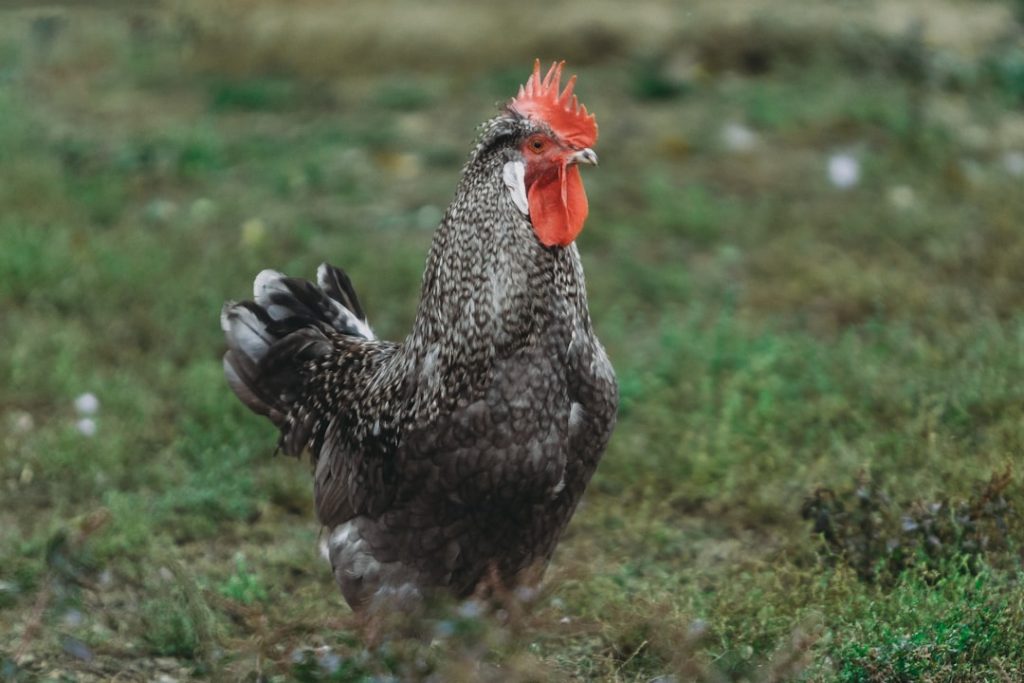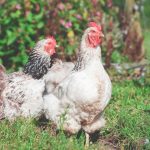Hybrid breeds of chickens are the result of crossbreeding two different purebred chicken breeds. This crossbreeding is done to create chickens that possess the desirable traits of both parent breeds. These traits can include high egg production, good meat quality, disease resistance, and adaptability to different climates.
Hybrid chickens are often bred for specific purposes, such as egg production or meat production, and are known for their superior performance in these areas. They are also bred to exhibit certain characteristics, such as docility, foraging ability, and overall hardiness. Hybrid breeds are popular among poultry farmers and backyard chicken keepers due to their productivity and versatility.
Hybrid chickens are typically categorized into two main types: sex-linked hybrids and hybrid crosses. Sex-linked hybrids are created by crossing two different purebred chicken breeds to produce offspring with distinguishable physical characteristics that indicate their sex at hatching. This makes it easier for farmers to separate male and female chicks early on, which is important for managing flock populations.
Hybrid crosses, on the other hand, are the result of crossing two different purebred chicken breeds to create offspring with a combination of desirable traits from both parent breeds. These hybrids are often bred for specific purposes, such as egg or meat production, and are known for their superior performance in these areas. Overall, hybrid breeds of chickens are the product of careful breeding and selection to create chickens with the best qualities of both parent breeds.
Table of Contents
- 1 The benefits of raising hybrid breeds
- 2 Popular hybrid breeds and their characteristics
- 3 How to care for hybrid breeds
- 4 Challenges of raising hybrid breeds
- 5 Breeding hybrid chickens
- 6 Is a hybrid breed right for you?
- 7 FAQs
- 7.1 What are hybrid breeds of chickens?
- 7.2 What are the advantages of hybrid breeds of chickens?
- 7.3 What are some popular hybrid breeds of chickens?
- 7.4 Are hybrid breeds of chickens suitable for backyard farming?
- 7.5 Do hybrid breeds of chickens have any health or behavioral issues?
- 7.6 Can hybrid breeds of chickens reproduce naturally?
Key Takeaways
- Hybrid breeds of chickens are created by crossing two different purebred chicken breeds to produce offspring with specific desired traits.
- Raising hybrid breeds can result in increased egg production, better meat quality, and overall hardiness and disease resistance.
- Popular hybrid breeds include the Golden Comet, Red Star, and Black Sex Link, known for their high egg production and friendly dispositions.
- Caring for hybrid breeds involves providing a balanced diet, proper housing, regular health checks, and protection from predators.
- Challenges of raising hybrid breeds may include higher initial costs, potential health issues, and difficulty in finding purebred stock for breeding.
The benefits of raising hybrid breeds
Superior Productivity
Hybrid breeds are specifically bred for high egg production or good meat quality, making them highly efficient for commercial or personal use. Hybrid layers are known for their ability to lay a large number of eggs consistently, making them a popular choice for egg production operations. Similarly, hybrid broilers are bred for fast growth and efficient feed conversion, resulting in high-quality meat in a shorter amount of time. This productivity can lead to increased profitability for farmers and a more sustainable source of food for households.
Adaptability and Hardy Nature
In addition to their productivity, hybrid breeds are also known for their adaptability and disease resistance. These chickens are often bred to be hardy and resilient, making them well-suited for various climates and environmental conditions. This can be especially beneficial for backyard chicken keepers who may not have as much experience in poultry care, as hybrid chickens tend to be more forgiving of minor mistakes in management.
Disease Resistance and Overall Benefits
Furthermore, many hybrid breeds exhibit good resistance to common poultry diseases, reducing the risk of illness within the flock and minimizing the need for medical intervention. Overall, the benefits of raising hybrid breeds include increased productivity, adaptability, and disease resistance, making them an attractive option for both commercial and personal poultry operations.
Popular hybrid breeds and their characteristics

There are several popular hybrid breeds of chickens that are widely recognized for their superior qualities and performance. One of the most well-known hybrid breeds is the ISA Brown, which is a cross between Rhode Island Red and Rhode Island White chickens. The ISA Brown is highly regarded for its exceptional egg-laying abilities, with hens capable of producing over 300 brown eggs per year.
These chickens are also known for their friendly disposition and adaptability to various management systems, making them a popular choice for backyard chicken keepers and commercial egg producers alike. Another popular hybrid breed is the Cornish Cross, which is a cross between Cornish and White Plymouth Rock chickens. The Cornish Cross is specifically bred for meat production and is known for its rapid growth and efficient feed conversion.
These chickens reach market weight in a relatively short amount of time, making them a preferred choice for commercial meat production operations. Additionally, the Cornish Cross is valued for its tender and flavorful meat, making it a popular choice among consumers. The Red Sex Link is another popular hybrid breed that is created by crossing specific purebred chicken breeds to produce offspring with distinguishable physical characteristics that indicate their sex at hatching.
This makes it easier for farmers to separate male and female chicks early on, which is important for managing flock populations. Red Sex Link hens are known for their high egg production and excellent feed efficiency, making them a popular choice for egg production operations. Overall, these popular hybrid breeds exhibit desirable traits such as high productivity, adaptability, and disease resistance, making them valuable additions to any poultry operation.
How to care for hybrid breeds
Caring for hybrid breeds of chickens requires attention to their specific needs and characteristics to ensure their health and productivity. Proper housing is essential for hybrid chickens, as it provides protection from predators, extreme weather conditions, and disease transmission. The coop should be spacious enough to accommodate the flock comfortably and should include nesting boxes for egg-laying hens.
Additionally, proper ventilation and insulation are important to maintain a healthy environment within the coop. Feeding hybrid chickens a balanced diet is crucial for their growth, egg production, and overall health. Commercially formulated poultry feeds are available for different stages of growth and production, providing the necessary nutrients for hybrid chickens to thrive.
Additionally, access to clean water at all times is essential to prevent dehydration and ensure proper digestion. Regular health checks and preventive measures are important for maintaining the well-being of hybrid chickens. This includes monitoring for signs of illness or injury, administering vaccinations as needed, and practicing good biosecurity measures to prevent the spread of diseases within the flock.
Additionally, providing opportunities for exercise and natural behaviors such as scratching and dust bathing can contribute to the overall welfare of hybrid chickens. Overall, caring for hybrid breeds of chickens involves providing proper housing, nutrition, healthcare, and environmental enrichment to support their well-being and productivity.
Challenges of raising hybrid breeds
While there are many benefits to raising hybrid breeds of chickens, there are also challenges that come with managing these birds. One challenge is the potential for genetic issues associated with crossbreeding. Hybrid chickens may inherit genetic traits from both parent breeds that can lead to health problems or reduced productivity.
This can include issues such as susceptibility to certain diseases or reproductive abnormalities that may impact egg production or fertility. Another challenge is the need for careful management of hybrid flocks to maintain their productivity and well-being. Hybrid chickens are often bred for specific purposes such as egg or meat production, which means that they may require more specialized care compared to traditional purebred chickens.
This can include monitoring their growth rates, egg-laying patterns, and overall health to ensure that they are meeting performance expectations. Additionally, maintaining genetic diversity within hybrid flocks is important to prevent inbreeding and preserve desirable traits. This may require careful selection of breeding stock and periodic introduction of new genetic lines to maintain the vigor and productivity of the flock.
Overall, while raising hybrid breeds of chickens can be rewarding, it also requires careful attention to genetic issues, specialized management practices, and maintaining genetic diversity within the flock.
Breeding hybrid chickens

Selection of Parent Stock
The process begins with choosing purebred chicken breeds that possess complementary qualities that can be passed on to their offspring. For example, if the goal is to create a hybrid breed with high egg-laying abilities, the parent breeds may be selected based on their individual egg production rates and other relevant traits.
Producing Hybrid Offspring
Once the parent stock is selected, crossbreeding is carried out to produce hybrid offspring that exhibit a combination of desirable traits from both parent breeds. This may involve natural mating or artificial insemination depending on the specific breeding goals and available resources.
Maintenance and Improvement
After the hybrid offspring are produced, careful selection and breeding practices are used to maintain and improve the desired traits within the flock. This may involve culling birds that do not meet performance standards or introducing new genetic lines to enhance genetic diversity. Overall, breeding hybrid chickens requires careful selection of parent stock, crossbreeding to produce desirable offspring, and ongoing management practices to maintain and improve the desired traits within the flock.
Is a hybrid breed right for you?
In conclusion, raising hybrid breeds of chickens offers numerous benefits such as high productivity, adaptability, and disease resistance. Popular hybrid breeds such as the ISA Brown, Cornish Cross, and Red Sex Link are known for their superior qualities and performance in egg or meat production. Caring for hybrid breeds involves providing proper housing, nutrition, healthcare, and environmental enrichment to support their well-being and productivity.
However, there are also challenges associated with raising hybrid breeds such as genetic issues related to crossbreeding and specialized management requirements. Breeding hybrid chickens involves careful selection of parent stock, crossbreeding to produce desirable offspring, and ongoing management practices to maintain and improve the desired traits within the flock. Ultimately, whether a hybrid breed is right for you depends on your specific goals and resources as a poultry farmer or backyard chicken keeper.
If you prioritize high productivity and adaptability in your flock, then raising hybrid breeds may be a suitable option for you. However, it is important to consider the potential challenges associated with managing hybrid flocks and ensure that you have the knowledge and resources necessary to care for these birds effectively.
If you’re interested in learning more about hybrid breeds of chickens, you might also want to check out this article on Snaplock Chicken Coop. It discusses the importance of providing a safe and secure environment for your chickens, which is essential for any breed, including hybrids. Additionally, you can explore ideas for large chicken coops and portage options for your chickens on the same website.
FAQs
What are hybrid breeds of chickens?
Hybrid breeds of chickens are the result of crossing two different purebred chicken breeds to create a new hybrid breed. These hybrids are often bred for specific traits such as egg production, meat quality, or disease resistance.
What are the advantages of hybrid breeds of chickens?
Hybrid breeds of chickens are often bred for specific desirable traits such as high egg production, fast growth, or resistance to certain diseases. This can make them more productive and efficient for commercial or backyard poultry farming.
What are some popular hybrid breeds of chickens?
Some popular hybrid breeds of chickens include the ISA Brown, Red Sex Link, and Black Sex Link. These hybrids are known for their high egg production and are commonly used in commercial egg production operations.
Are hybrid breeds of chickens suitable for backyard farming?
Yes, many hybrid breeds of chickens are well-suited for backyard poultry farming. They are often bred for traits that make them easy to care for and productive in a backyard setting, such as good egg production and docile temperaments.
Do hybrid breeds of chickens have any health or behavioral issues?
While hybrid breeds of chickens are often bred for specific traits, they can sometimes be more prone to health issues such as reproductive problems or susceptibility to certain diseases. Additionally, some hybrids may exhibit more aggressive or flighty behavior compared to purebred chickens.
Can hybrid breeds of chickens reproduce naturally?
In most cases, hybrid breeds of chickens are the result of specific crosses between two purebred chicken breeds and are not able to reproduce true to type. This means that if hybrid chickens are allowed to breed naturally, their offspring may not exhibit the same desired traits as the parent hybrids.
Meet Walter, the feathered-friend fanatic of Florida! Nestled in the sunshine state, Walter struts through life with his feathered companions, clucking his way to happiness. With a coop that’s fancier than a five-star hotel, he’s the Don Juan of the chicken world. When he’s not teaching his hens to do the cha-cha, you’ll find him in a heated debate with his prized rooster, Sir Clucks-a-Lot. Walter’s poultry passion is no yolk; he’s the sunny-side-up guy you never knew you needed in your flock of friends!







